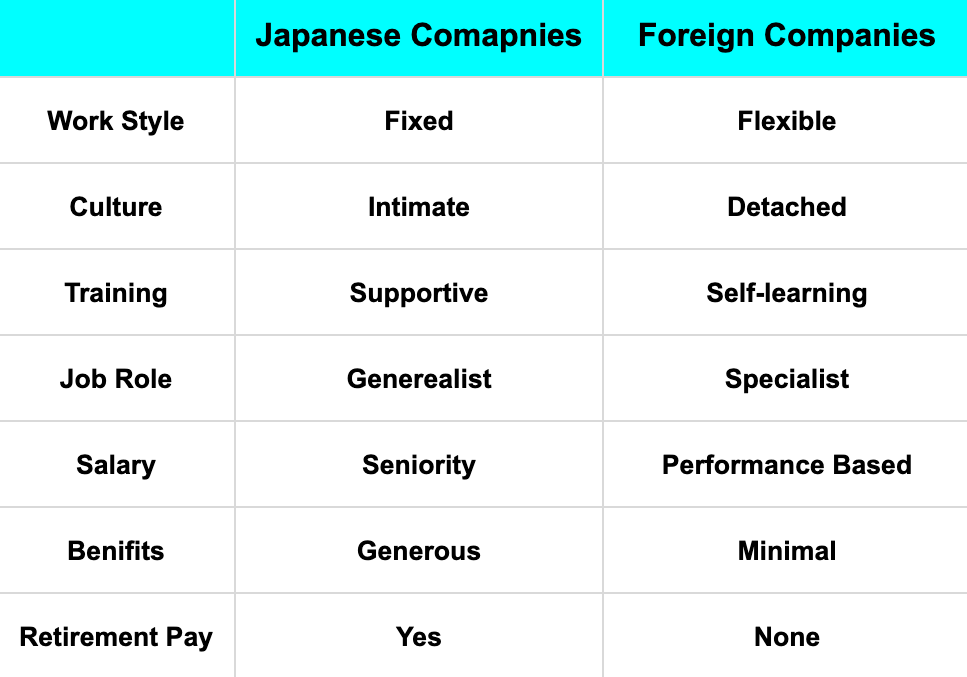Definition of Japanese companies and foreign companies
You can separate Japanese companies into two big categories. “Japanese companies”, and “foreign companies”. The difference between Japanese companies and foreign companies is whether more than half of the percentage of shares held by a foreign entity or not. The location of the headquarters can be another determining factor, but this is not quite accurate.
If you are living in the United States you may not think so much about the difference between Sony and Apple. They are just another tech company, and it doesn’t really matter whether a major part of the shares are owned by a foreign entity or not, right? Well, in Japan, it is a big deal. A lot of people actually look for jobs based on this classification.
In this article, we will explain how this classification holds signification in the Japanese job market, and why it is still relevant to this day.
“Gaishi ka Nikkei, Mayouna~”
「外資か日系、迷うな〜」(Gaishi ka Nikkei, Mayouna~) This literally means, “I’m not sure if I should go with a foreign company or a Japanese company”. This is a common debate topic for job hunters and some people may only apply to foreign companies, and some may only go for Japanese companies.
Why do Japanese people focus so much on the difference of owned equity of the company? Well, because it affects work style, culture, and compensation greatly, depending on which one you choose. Typically there is a stereotype that Japanese companies and foreign companies differ in the following criteria shown below.

Keeping in mind that this is a generalization, overall this tendency is still present. People who prefer one side, seem to focus mainly on these criteria. In the next section, we will explain more deeply, how these items differ between the companies.
Difference between working at a Japanese and foreign company in Japan
Generally, a young and aggressive person who wants to climb up the ladder of success quickly chooses to work at a foreign company. On the other hand, someone who is somewhat laid back and wants to work in a less competitive environment tends to choose to work at a Japanese company. This choice makes sense because you can tell that the two characteristics apply to the criteria in the table above.
Work Style
The work style at a Japanese company is maybe a little more strict than in foreign companies. In a foreign company, the stance usually is, “We don’t care what kind of work style you have, as long as you perform well.” Work style includes work hours, dress code, manners, and so on. Although, in recent years, Japanese companies are trying to introduce flexible work hours with core time(such as 10 AM ~ 4 PM).
Culture
Foreign companies tend to have a “Work Hard, Play Hard” culture. This job will be demanding a lot from you, physically and mentally. If you are an efficient worker, you can leave early, and you can also grab that big bonus. However, if you are struggling, the company won’t wait for you to catch up.
Training
In a Japanese company(large corporations or subsidiaries of major companies), there is a systematic educational system where they plan to nurture you in a longer time span. If you want to push yourself too much and have steady growth, a Japanese company will be the perfect fit for you.
Job Role
In Japan, there is a term called, “総合職” (Sougoushoku), and a lot of companies write this in their job role section of their recruiting page. This role means, you are a generalist who works for the “company”. You are going to advance through your career within the company by periodically changing job roles. On the other hand, in a foreign company, you are going to advance through your career by specializing in a specific role, and by switching companies multiple times.
Benefits
The benefits of a Japanese company are usually significantly better than that of foreign companies. This includes housing support, company-owned vacation resorts, financial aids, special offers, and the list goes on. In a foreign company, they just pay you a high salary instead, and maybe the offices are slightly more modern looking.
Retirement Pay
If you are young, you may not be thinking about retirement, but this is a big point to think about when you’re choosing a company to work for. Usually, a foreign company will either not have any sort of retirement payment at all or just have a Japanese version of a 401k plan (確定拠出年金). On the other hand, a Japanese company will pay you a handsome sum of cash when you leave the company after working for several years. (Usually after 5 ~ 10 years, there will be a some type of retirement pay)
So should I work at a Japanese or foreign company?
We have reviewed all of the benefits and disadvantages of working at a Japanese company and at a foreign company. However, you may be still wondering which category is best suited for you. In order to answer this question, you should imagine what kind of person you are and what kind of work / private life you want.
If you want to focus only on working hard and getting a lot of cash early on in your career, maybe a foreign company may be better for you. Maybe you are in your 40s and you have kids and want to have a more balanced work style. In that case, maybe you should consider working at a Japanese company.
However, you should definitely research the companies, on sites such as xkula.com before joining the company. Some foreign companies do have fairly balanced work styles and good benefits such as Google Japan. On the other hand, some Japanese companies will make you work like crazy long hours every day like they are still in the Japanese bubble era (1980’s).
If you have decided to work at a Japanese company, please keep in mind that a lot of Japanese companies don’t hire through the year. They usually hire from fall to winter, so that you can join the company in April, where a lot of companies begin their new fiscal year. They also do not hire a lot of mid-career talents compared to foreign companies, so you should keep track of when they are hiring!













